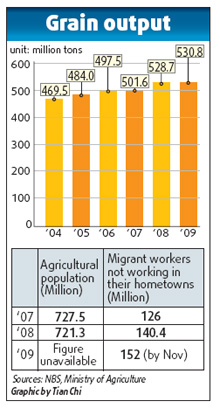Top Biz News
More help for new migrant workers
By Xin Dingding (China Daily)
Updated: 2010-02-02 07:47
 |
Large Medium Small |
The country is facing fresh problems brought by a new generation of migrant workers and it plans to help more farmers migrate to urban areas to close the widening income gap between villages and cities, officials said.
About 60 percent of China's 150 million migrant workers are aged 30 or younger, Tang Renjian, deputy director of the Central Rural Work Leading Group, told a press conference yesterday.
This group of laborers, born in the 1980s and 1990s, are "the new generation of migrant workers", he said.
They are better educated than their parents but have limited knowledge of farming and little interest in it, he said.
"They want to become part of the city and embrace a civilized life, but at the same time cities are not ready to accept this new group of people," he said.
"This is an important issue concerning changes in China's social structure in the rural area and in the entire country."

The central government has realized the importance of the issue and addressed the group for the first time in this year's "No 1 Central Document", a major policy document issued on Sunday.
What makes the group of workers important is their differences from their parents.
Han Changfu, minister of agriculture, said in an article published in the People's Daily yesterday that this new generation of migrant workers are not going to stand for the discrimination that their parents have taken in cities, nor are they ready to accept the huge disparities between the urban and rural areas.
"Under the influence of a modern, open society, they have developed simple but blind ideas about equality and democracy," wrote Han, who had headed a study on migrant workers for the State Council in 2005.
The new group wants to be treated in the same way as urban residents, in employment and public services, he said.
"(This difference) is related to the growing call for defending migrant workers' rights," he said.
The central government has identified it as "a top priority to help them become urban residents", Tang said.
The government will facilitate more farmers to migrate to cities and receive the housing, insurance, social security, education and other benefits that urban residents enjoy, Tang said.
Chen Xiwen, deputy director of the Central Rural Work Leading Group, said at the press conference that small and middle-sized cities will be the focus of China's urbanization in the next stage.
| ||||
"Life in the smaller cities will not only make their dream come true, but also be affordable with their income," he said.
He also suggested that the hukou, or household registration system, in the small and middle-sized cities should be opened up, with efforts made to accelerate the economic development of townships.
Tang also said yesterday the central government will increase spending on agriculture and rural areas, which would be proportionally higher than the central government's overall budget increase this year.
Last year, the central government spent 764.1 billion yuan ($112 billion) on agriculture and rural areas, up 120 billion yuan from the previous year.
AP contributed to the story













